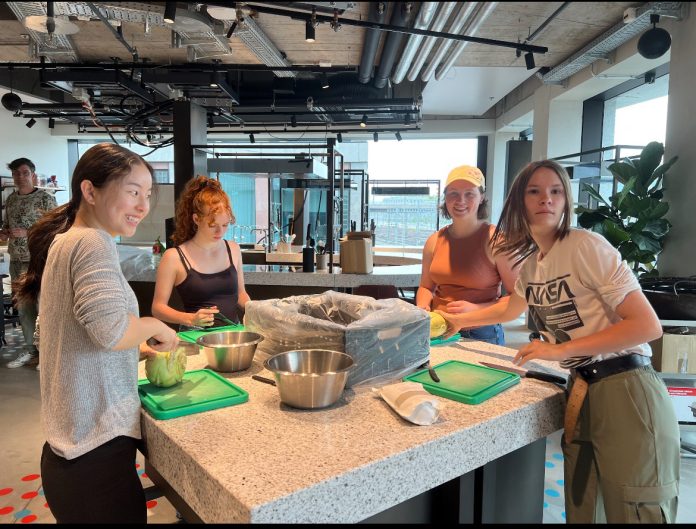By Hazel Weakley
This summer, my Girl Scout troop had the amazing chance to visit Zurich, Switzerland, to study sustainability at the Swiss Federal Institute of Technology. We dived into energy, waste management, and agriculture. Given Pennsylvania’s rich farming history, I was especially intrigued by how local farming practices fit into sustainable living. With 52,000 farms and 7.3 million acres of farmland, agriculture is a huge part of Pennsylvania’s heritage and economy, generating around $83.8 billion in direct output and supporting over 280,000 jobs.
My interest in agriculture and gardening sparked from my mother, who has a garden she lovingly calls her “Mini-Farm.” In her garden, she cultivates a variety of herbs, including several types of mint (in containers, of course!), basil, oregano, lemon verbena, sage, and cilantro. This hands-on experience with fresh herbs has deepened my appreciation for local produce and the locavore lifestyle.
 My Girl Scout Gold Award project also revolves around agriculture. I’m working with Trellis for Tomorrow in Phoenixville, PA, to add berry bushes to their garden, aiming to provide fresh berries to Phoenixville Area Community Services for those facing food insecurity. I’m also passionate about spreading the word on the benefits of being a “locavore” and how it can positively impact you, our environment, and our community.
My Girl Scout Gold Award project also revolves around agriculture. I’m working with Trellis for Tomorrow in Phoenixville, PA, to add berry bushes to their garden, aiming to provide fresh berries to Phoenixville Area Community Services for those facing food insecurity. I’m also passionate about spreading the word on the benefits of being a “locavore” and how it can positively impact you, our environment, and our community.
What Is a Locavore?
So, what exactly is a locavore? A locavore is someone who makes a point to eat food that’s grown or produced within a specific area—usually within 100 to 250 miles from home. The idea is to support local agriculture, cut down on the environmental impact of long-distance food transport, and enjoy the freshest possible produce.
Benefits of a Locavore Lifestyle
- Fresher, Tastier Food: Eating locally means you’re getting food that’s often picked at its peak ripeness. This makes it not only fresher but also much more flavorful. Fresh produce can significantly enhance your meals, providing a better and more enjoyable eating experience.
- Supports Local Economies: Buying from local farmers and producers helps boost your community’s economy. Local businesses are likely to spend their earnings back in the community, which helps create jobs and supports local infrastructure. This is crucial for keeping small towns and rural areas vibrant and thriving.
- Reduces Environmental Impact: Transporting food from far away requires a lot of energy and creates significant greenhouse gases. By choosing local foods, you reduce the carbon footprint linked to food transport. Plus, many local food systems use fewer chemicals and promote more sustainable farming practices.
- Strengthens Community Connections: When you eat locally, you build a stronger connection with your food and the people who grow it. This means getting to know local farmers and artisans and understanding more about how your food is produced. It’s a great way to appreciate the effort that goes into your meals and foster a sense of community.
- Enhances Seasonal Eating: Locavores usually eat foods that are in season, which means their diet naturally shifts with what’s available throughout the year. This approach not only diversifies your diet but also aligns with nature’s cycles, promoting a more balanced and varied eating pattern.
- Promotes Food Security: Supporting local food systems can make your community more food secure by reducing reliance on distant sources and global supply chains. A strong local food network is better equipped to handle disruptions, ensuring a steady supply of fresh food.
 Getting Started as a Locavore
Getting Started as a Locavore
If you’re ready to embrace the locavore lifestyle and support local agriculture, here are some tips to help you get started, no matter where you are in the United States:
- Explore Local Farmers’ Markets: Farmers’ markets are a great place to discover fresh, local produce and artisanal goods. For example, in Phoenixville, you can visit the Phoenixville Farmers Market, which offers a variety of locally sourced herbs and produce.
- Join a Community Supported Agriculture (CSA) Program: CSA programs allow you to receive a regular supply of seasonal produce directly from local farms. Check out local farms or CSA directories like Farmigo or LocalHarvest to find programs near you.
- Visit Local Farm Stores and Co-ops: Many regions have farm stores or cooperatives that sell fresh, locally sourced products. Visit these stores to find high-quality meats, cheeses, and produce.
- Dine at Farm-to-Table Restaurants: Support restaurants that focus on farm-to-table dining and emphasize locally sourced ingredients. Use online review sites or local food guides to find establishments near you that prioritize local and seasonal foods.
 Grow Your Own Produce: If you have space, consider growing your own vegetables, herbs, or fruits. Even a small container garden can provide fresh produce and reduce your reliance on store-bought items. Limited space? Consider growing herbs in a windowsill. The flavor will enhance your dishes and allow you to explore the variety that herbs can offer.
Grow Your Own Produce: If you have space, consider growing your own vegetables, herbs, or fruits. Even a small container garden can provide fresh produce and reduce your reliance on store-bought items. Limited space? Consider growing herbs in a windowsill. The flavor will enhance your dishes and allow you to explore the variety that herbs can offer.- Get Involved with Local Food Organizations: Many communities have food organizations and nonprofits focused on local agriculture and food security. Volunteering or supporting these groups can enhance your connection to local food systems.
By incorporating these practices into your routine, you’ll not only enjoy fresher and tastier food but also contribute to a healthier environment and a stronger community. Start exploring local options today and experience the many benefits of the locavore lifestyle!
Medicinal Disclaimer: It is the policy of The Herb Society of America, Inc. not to advise or recommend herbs for medicinal or health use. This information is intended for educational purposes only and should not be considered as a recommendation or an endorsement of any particular medical or health treatment. Please consult a health care provider before pursuing any herbal treatments.
Photo Credits: 1) Phoenixville area Girl Scout troop in Zurich, Switzerland; 2) Instructor at the Swiss Federal Institute of Technology teaching about sustainable agriculture; 3) Girl Scouts cooking together; 4) Girl Scout digging in local garden. All photos courtesy of the author.
Hazel Weakley is a senior at Phoenixville Area High School, where she is a cheerleader. She is also involved with Girl Scouts, and she is currently an Ambassador and very active in volunteering for community services. As a barista, her favorite drink to make is a caramel frappuccino. Hazel plans on attending college and is still exploring various majors.




